Toyota RAV4 (XA40) 2013-2018 Service Manual: Evaporative emission control system incorrect purge flow

Dtc summary
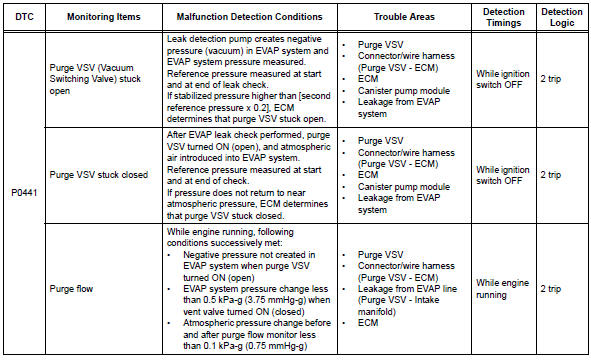
Description
The description can be found in the evap (evaporative emission) system (see page es-335).
Inspection procedure
Refer to the evap system (see page es-340).
Monitor description
The two monitors, key-off and purge flow, are used to detect malfunctions relating to dtc p0441. The key-off monitor is initiated by the ecm internal timer, known as the soak timer, 5 hours* after the ignition switch is turned off. The purge flow monitor runs while the engine is running.
- Key-off monitor
5 Hours* after the ignition switch is turned off, the leak detection pump creates negative pressure (vacuum) in the evap system. The ecm monitors for leaks and actuator malfunctions based on the evap pressure.
Hint:
*: If the engine coolant temperature is not below 35°c (95°f) 5 hours after the ignition switch is turned off, the monitor check starts 2 hours later. If it is still not below 35°c (95°f) 7 hours after the ignition switch is turned off, the monitor check starts 2.5 Hours later.

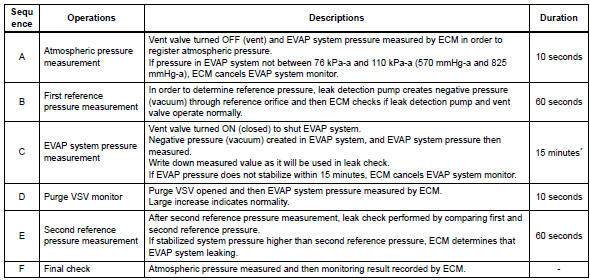
*: If only a small amount of fuel is in the fuel tank, it takes longer for the evap pressure to stabilize.
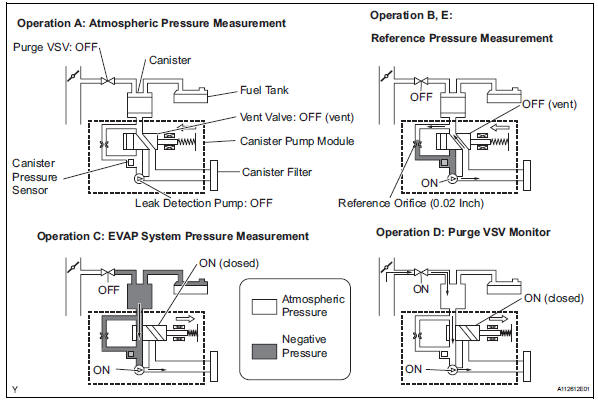
- Purge vsv stuck open
In operation c, the leak detection pump creates negative pressure (vacuum) in the evap system.
The evap system pressure is then measured by the ecm using the canister pressure sensor. If the stabilized system pressure is higher than [second reference pressure x 0.2], The ecm interprets this as the purge vsv (vacuum switching valve) being stuck open. The ecm illuminates the mil and sets the dtc (2 trip detection logic).
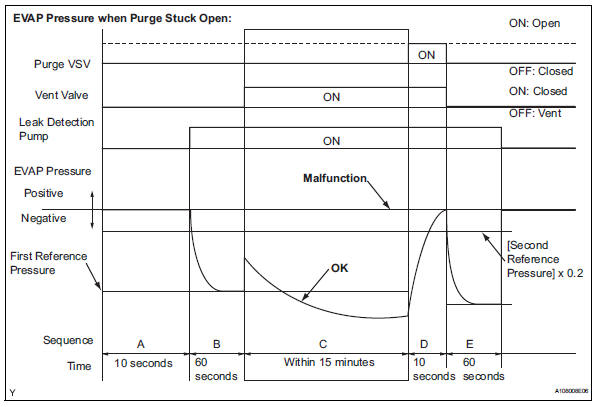
- Purge vsv stuck closed
In operation d, the canister pressure sensor measures the evap system pressure. The pressure measurement for purge vsv monitor is begun when the purge vsv is turned on (open) after the evap leak check. When the measured pressure indicates an increase of 0.3 Kpa-g (2.25 Mmhg-g) or more, the purge vsv is functioning normally. If the pressure does not increase, the ecm interprets this as the purge vsv being stuck closed. The ecm illuminates the mil and sets the dtc (2 trip detection logic).
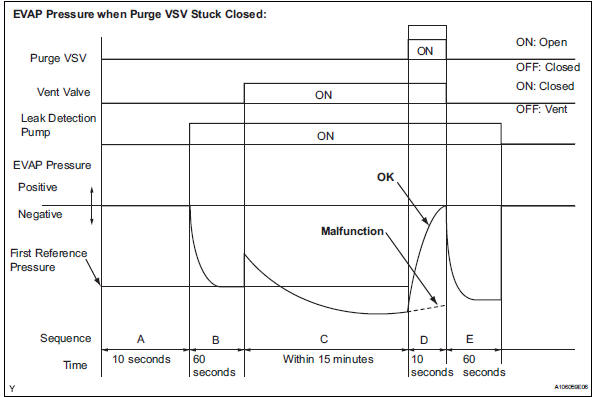
- Purge flow monitor
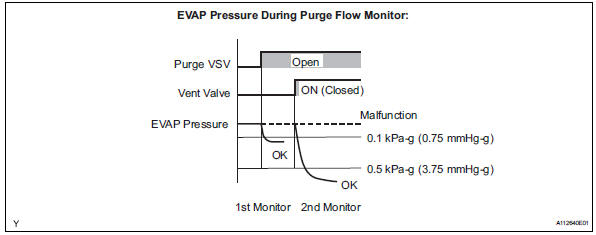
The purge flow monitor consists of the two step monitors. The 1st monitor is conducted every time and the 2nd monitor is activated if necessary.
- The 1st monitor
While the engine is running and the purge vsv is on (open), the ecm monitors the purge flow by measuring the evap pressure change. If negative pressure is not created, the ecm begins the 2nd monitor.
- The 2nd monitor
The vent valve is turned on (closed) and the evap pressure is then measured. If the variation in the pressure is less than 0.5 Kpa-g (3.75 Mmhg-g), the ecm interprets this as the purge vsv being stuck closed, and illuminates the mil and sets dtc p0441 (2 trip detection logic).
Atmospheric pressure check: in order to ensure reliable malfunction detection, the variation between the atmospheric pressures, before and after conduction of the purge flow monitor, is measured by the ecm.
Obd ii monitor specifications
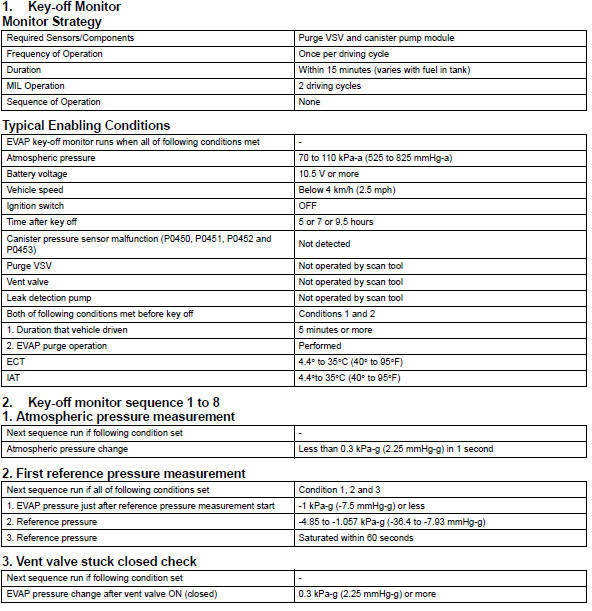
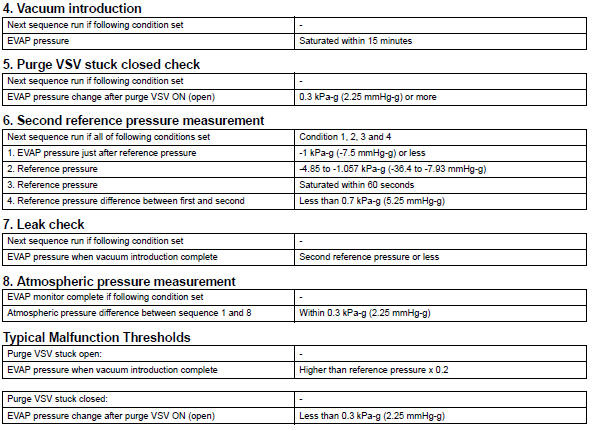
Obd ii monitor specifications
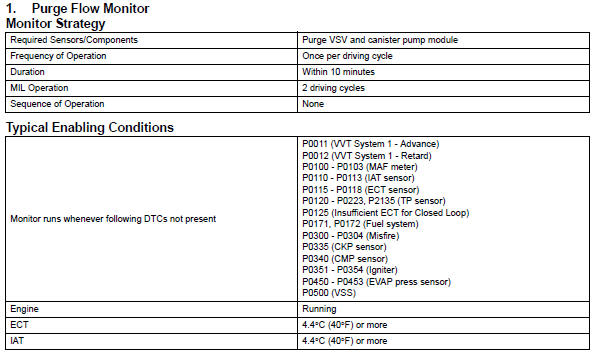

Monitor result
Refer to checking monitor status (see page es-17).
 Evaporative emission system reference orifice
Evaporative emission system reference orifice
Dtc summary
Hint:
The reference orifice is located inside the canister pump module.
Description
The description can be found in the evap (evaporative emission) system (see
page es-335).
...
 Evaporative emission control system pressure sensor
Evaporative emission control system pressure sensor
Dtc summary
Hint:
The canister pressure sensor is built into the canister pump module.
Description
The description can be found in the evap (evaporative emission) system (see
page es ...
Other materials:
Assist grips
An assist grip installed on the ceiling
can be used to support your
body while sitting on the seat.
Caution
Assist grip
Do not use the assist grip when getting in or out of the vehicle or
rising from
your seat.
Doing so could damage the assist grip, or could cause you to injure yourse ...
Key lock-in prevention function does not work properly
Description
When the key is in the ignition key cylinder or the door courtesy light on
signal is output to the main body
ecu, performing the door lock operation with the lock switch does not lock the
door.
Wiring diagram
Inspection procedure
Read value of intelligent tester (unlock w ...
Switches
Driving position memory switches*1
Window lock switch
Power window switches
Door lock switches
Outside rear view mirror switches
"ODO TRIP" switch (vehicles with 7-inch multi-information display)
"ODO TRIP" switch (vehicles with 12.3-inch multi-information
display)
Instrument panel light ...
